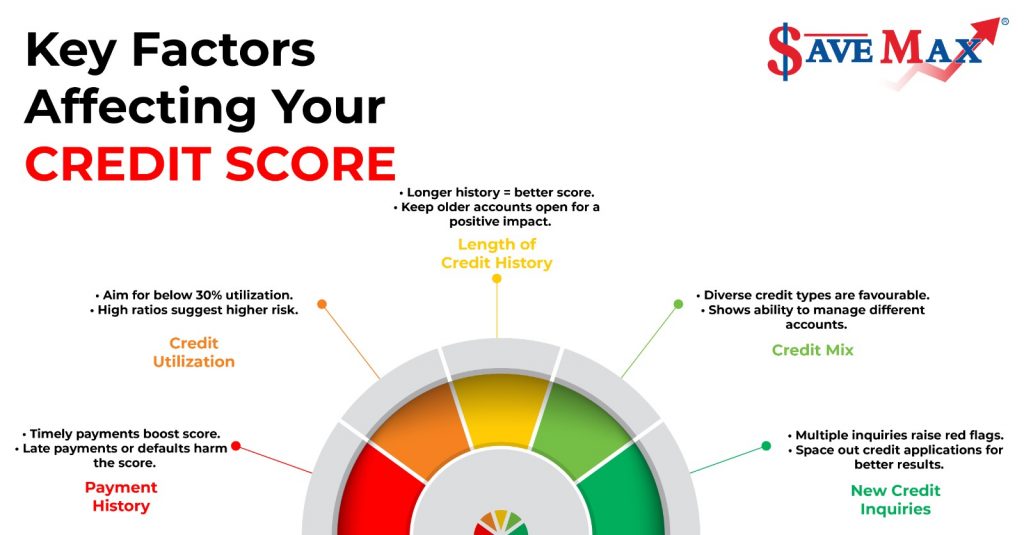Getting a Mortgage in Canada with Bad Credit: Your Options
In the current real estate market, it may seem impossible to obtain a mortgage with bad credit. However, this is a misconception.
Even if you have less-than-perfect credit, you can still make your dream of owning a home in Canada a reality. By adopting the right approach and acquiring the necessary knowledge, obtaining a mortgage with bad credit can become less daunting, and you can still secure financing despite your credit score.
This all-encompassing blog offers valuable insights and practical tips to assist you in acquiring a mortgage with bad credit in Canada, enabling you to achieve your homeownership objectives.
Table of Content
What is Bad Credit?
It’s essential to comprehend what constitutes bad credit and how it can affect your ability to obtain financing before delving into the specifics of securing a mortgage with bad credit.
In Canada, credit scores usually range from 300 to 900, with higher scores indicating better creditworthiness. A credit score below 600 is usually classified as poor or bad, making it difficult to qualify for conventional mortgage products provided by banks and financial institutions.
Factors that can contribute to bad credit include missed payments, high credit card balances, bankruptcy, foreclosure, or a history of late payments.

How Does a Bad Credit Score Impact Your Mortgage?
Getting a mortgage is heavily dependent on your credit score. If you have a bad credit score, it can significantly impact your eligibility and the terms you receive from lenders.
Here’s how:
Higher Interest Rates:
Having a bad credit score can significantly impact your ability to secure a mortgage, as lenders may offer you higher interest rates. This is because borrowers with lower credit scores are viewed as higher risk, and lenders may charge higher interest rates to offset this risk.
You’ll end up paying more in interest over the life of your loan, which can increase the overall cost of homeownership.
Limited Mortgage Options:
If you have a bad credit score, you may find that your options for mortgage products are limited. This is because traditional lenders such as banks and credit unions have stricter eligibility criteria for borrowers with bad credit, making it challenging to qualify for conventional mortgage loans.
As a result, you may need to explore alternative mortgage options, such as subprime mortgages or private lenders.
Larger Down Payment Requirements:
Borrowers with bad credit may be required to provide a larger down payment to mitigate the risk of default. This is because lenders view borrowers with bad credit as riskier, and a larger down payment can reduce the lender’s exposure.
Additionally, a larger down payment can provide reassurance that you have a significant stake in the property.
While the minimum down payment required for a mortgage in Canada is typically 5% of the purchase price, borrowers with bad credit may be asked to provide a higher percentage upfront.
Mortgage Insurance Premiums:
If you have a bad credit score and cannot make a down payment of at least 20% of the purchase price, you’ll be required to purchase mortgage default insurance through the Canada Mortgage and Housing Corporation (CMHC) or other private insurers.
Mortgage default insurance protects the lender in case you default on your loan and is typically added to your mortgage payments.
The cost of mortgage insurance premiums can vary based on the size of your down payment and your credit score.
Stricter Approval Process:
Lenders may subject borrowers with bad credit to a more rigorous approval process, including additional documentation requirements and closer scrutiny of your financial history.
You may be asked to provide explanations for any past credit issues, demonstrate stable income and employment, and show evidence of your ability to afford the mortgage payments.
The approval process for a mortgage with bad credit may take longer and require more effort on your part to satisfy the lender’s requirements.

How to Get a Mortgage with Bad Credit in Canada?
If you’re having difficulty finding a traditional lender who will provide financing due to bad credit, there are alternative mortgage options in Canada that you can explore. These options include:
Subprime mortgages – Subprime mortgages are specifically tailored for borrowers with imperfect credit and may offer more relaxed lending requirements than traditional loans.
Although interest rates may be higher, subprime mortgages can help individuals with bad credit become homeowners.
Private Lenders – Private lenders, such as mortgage investment corporations (MICs) and private equity firms, focus on offering financing to borrowers who may not qualify for traditional bank loans due to poor credit or non-traditional income sources.
Private lenders usually have more relaxed eligibility requirements than traditional lenders but may charge higher interest rates and fees.
Alternative Financing Programs – For those with low income or credit challenges, government-backed programs and non-profit organizations offer alternative financing options.
These programs can provide financial assistance in the form of down payment support, subsidized interest rates, and other forms of aid to help borrowers obtain a mortgage.
In Canada, some examples of alternative financing programs include the Home Buyers’ Plan (HBP) which enables first-time homebuyers to withdraw funds from their Registered Retirement Savings Plan (RRSP) to use towards a down payment, and the First-Time Home Buyer Incentive (FTHBI) which offers shared-equity mortgages to eligible buyers.
Rent-to-own – Rent-to-own means you rent a property but have the option to buy it later on, usually within a set timeframe.
As you pay rent each month, a portion of the payment may go towards the eventual purchase price, which can help you build equity over time.
However, it’s important to thoroughly examine the terms of the agreement and make sure you fully comprehend your responsibilities as a tenant-buyer before committing to a rent-to-own program.
Co-signer or Joint Mortgage
If you have a close friend or family member who is financially stable and has good credit, you may want to consider requesting them to co-sign the mortgage or apply for a joint mortgage together.
With a co-signer, the risk associated with your poor credit can be mitigated, increasing your chances of approval. However, it’s vital to understand that the co-signer will be responsible for the loan and may be held liable if you default on payments.
Therefore, it’s mandatory to thoroughly discuss the implications with your co-signer before moving forward. Additionally, maintaining open communication and trust with your co-signer is crucial to ensure a successful co-signing arrangement.
Minimum Credit Score Required to Obtain a Mortgage
Typically, the minimum credit score necessary to qualify for a conventional mortgage is around 680, although this may vary depending on the lender and type of mortgage product.
It’s worth noting that some lenders may have slightly lower requirements, although a higher credit score is generally preferred.
If you’re seeking optimal approval chances and more favourable terms, a credit score above 700 is considered ideal when applying for a mortgage.
Improving Your Credit Score
When considering alternative mortgage options, it’s important to be proactive about improving your credit score over time. This can include:
Paying Bills on Time – One of the most effective ways to improve your credit score gradually is by paying all bills on time, including credit card payments, loans, and utilities.
Late payments can have a significant negative impact on your credit score, so you must ensure that you pay all bills on time each month.
By paying down debt, you can improve your credit utilization and demonstrate responsible financial management, which can positively impact your credit score over time.
Avoiding new credit inquiries – It’s important to note that every time you apply for new credit, it results in a hard inquiry on your credit report, which can temporarily lower your credit score. Therefore, it’s advisable to minimize new credit inquiries while working to improve your credit score.
This can help you maintain a healthy credit score and increase your chances of approval for alternative mortgage options.
Diversifying your credit accounts – Diversifying your credit accounts can also positively impact your credit score over time.
Having a mix of different types of credit accounts, such as credit cards, installment loans, and mortgage loans, can demonstrate to lenders that you can manage different types of credit responsibly.
In Canada, a less-than-ideal credit score may seem like a hurdle, but it’s important to remember that there are options and pathways available to help achieve the goal of homeownership.
By being proactive, exploring alternative mortgage solutions, and working towards improving credit, one can overcome the challenges associated with bad credit and secure financing for their dream home.
Your journey to homeownership awaits, and with the right mindset, you’re well-equipped to make it a reality.
